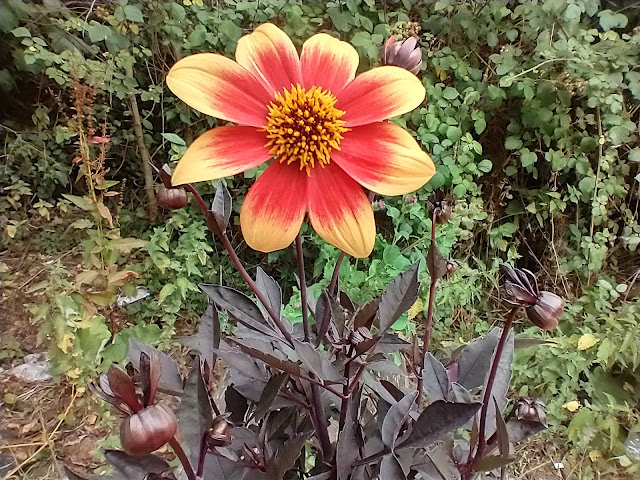Digging for Victory: Book Review
 Digging for Victory by Twigs Way and Mike Brown is a fascinating blend of gardening, history and social history. It tells the story of the government's WWII Dig for Victory campaign, richly illustrated by the stories of the people (or their offspring) who took up the call to grow more food, together with examples from the masses of ministry advisory leaflets, advertisements and articles from gardening magazines and books published at the time.
Digging for Victory by Twigs Way and Mike Brown is a fascinating blend of gardening, history and social history. It tells the story of the government's WWII Dig for Victory campaign, richly illustrated by the stories of the people (or their offspring) who took up the call to grow more food, together with examples from the masses of ministry advisory leaflets, advertisements and articles from gardening magazines and books published at the time.
I've written before about my concerns about how we might grow our own food in the future and pondered whether a similar campaign might be successful today. So it's been fantastic to have a review copy of this book to give me a better insight into the harsh reality of the 1940s. The campaign was judged to be a success, but Digging for Victory shows it wasn't without hardship along the way.
The story is told more or less in chronological order with varied side trips taken to view the role of the media, the changing role of women, the country house battleground and the involvement of children. It wasn't just vegetables either: the keeping of livestock such as pigs, chickens, rabbits and even goats was encouraged to help eke out the ration book and even provide a useful surplus for bartering. There's also the dawn of the gardening personality - in the form of Mr Middleton. He was much in demand for personal appearances at the time and one of his books has been reissued recently too.
I hadn't appreciated how the outbreak of war contributed to the demise of our orchards (many were grubbed up and re-planted with potatoes), how growing strawberries wasn't encouraged initially (considered a luxury crop, but later viewed as a morale booster) and the government's initial concerns that too many potatoes were being grown.
I hadn't realised that nurseries were actively involved in the campaign (though quite logical when you think about it) and how the government restricted the land used for their pre-war business to just 10%. Thus many valuable garden cultivars were lost during this time and the loss of income meant many nurseries went to the wall. It's also ironic that the campaign was 'exported' to Germany and Russia post-war to help these countries solve the problem of their starving populations.
It's amusing for us today to see nearly everything couched in terms of the battlefield - Cloches against Hitler!, Lighten the Navy's task!, Beans as Bullets! - but it also serves to illustrate how desperate things were at the time. By the end of the war around 1.4 million allotments were in production (there's around 300,000 today), each estimated to produce enough food to feed a family of 5 for a year.
Digging for Victory gives a thorough insight into how the issues of food security and being relatively self-sufficient as a nation have been tackled in the past and gives us much to think about today. Can these issues be tackled in the same way again? Probably not, as I believe we as a people aren't so accepting of government doctrine these days, plus we have less land available for cultivation and a larger population to feed. However, that doesn't mean to say there aren't lessons to be learnt and ideas which could be used.
It's a fascinating read and one I can thoroughly recommend.










This looks fantastic, somewhat similar in some ways to Defiant Gardens. Thanks!
ReplyDeleteAmazing to think how much was being produced by ordinary men and women during the war. With so much brownfield sites it's a shame more aren't cultivated now.
ReplyDeleteThis does sound like a fantastic read...interesting how everything old is new again, although for different reasons (we hope) this time around.
ReplyDeleteFascinating, looks like one to make subtle hints about to the wife before my birthday in a few weeks ;>)
ReplyDeleteOne of the older guys on our site tells of the older days when he used to go down with his Dad (presumably around the 50s by this stage), and he said the number of people walking down towards the plots on a Sunday afternoon was like going to a football match.
I look forward to reading this book as I really enjoyed Allotment & Garden Guide - A monthly guide to wartime gardening by Twiggs Way. Flighty xx
ReplyDeleteBenjamin - Ooh must look up Defiant Gardens :)
ReplyDeleteDamo - we'll probably have to soon though won't we?
Jodi - I can thoroughly recommend it!
RobD - what a wonderful memory! I hope your hints are successful :)
Flighty - I'm looking forward to reading that one, it looks fascinating :)